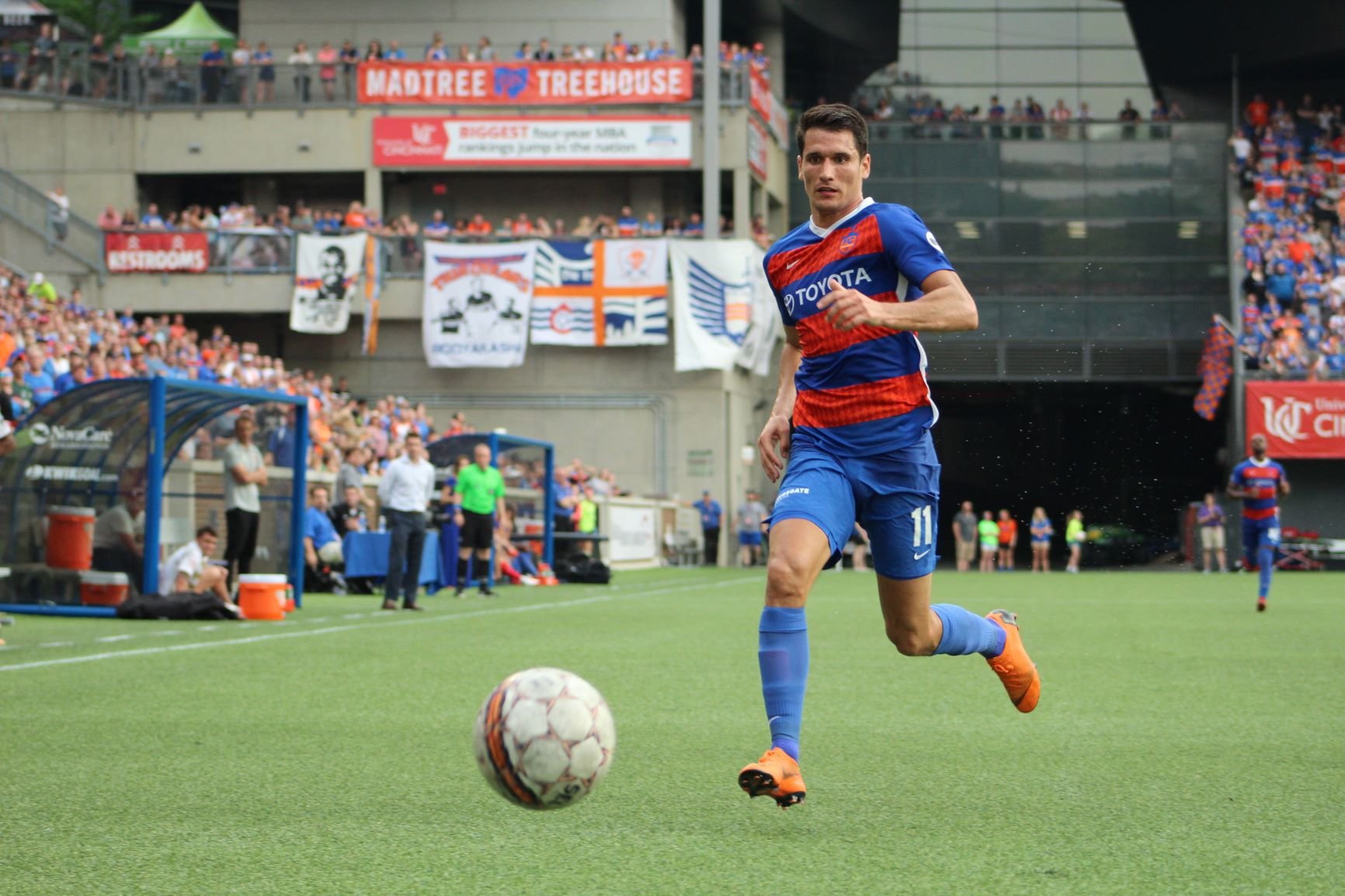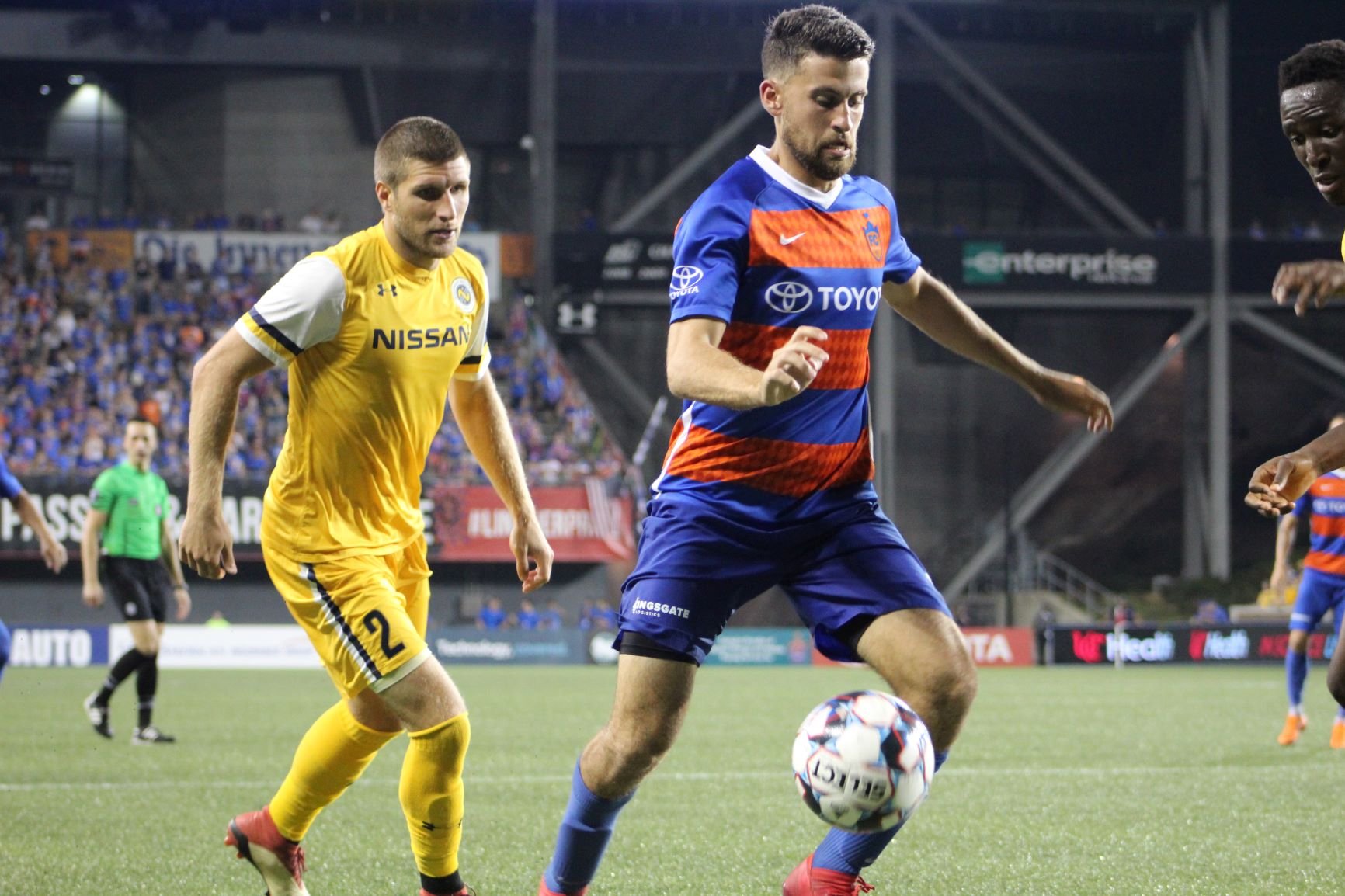Records, And Promises, Are Made To Be Broken
Mike Madanat
Entering the 2018 USL season, FC Cincinnati President Jeff Berding was quoted in an article with Fumi Kimura stating, “Although we did not end the 2017 season the way we wanted, we had a successful second year...[W]e saw the USL dramatically improve from 2016 to 2017 and frankly, we did not do all the things we needed to do in the off-season to prepare appropriately last year.” As you read that last quote and think back to the work the front office and technical staff put into building the 2018 roster, it becomes clear that Jeff & Co. were motivated to have a strong squad and learn their lesson from the previous year. By the end of that 2018 season, then FC Cincinnati coach Alan Koch would go on to lead the club to, at the time, a USL record for wins in a single season (23), points (77), and hoist the regular season championship trophy.
Even with that level of success, there was always a quiet, unspoken question from FC Cincinnati supporters and soccer fans alike: "Could Koch have done as well without Jeff and Carl providing him with the ability to sign an unbelievably talented squad?" Over the course of the last few months, I decided to take a deep dive into FC Cincinnati’s 2018 USL season – their last in USL before entering MLS. This became part one in a two part series that looks at how the team's ability to compete in USL to MLS transitioned on and off the pitch, with part two being a peak behind the curtain of player recruitment and decision making.
What I expected to be a write-up solely on FCC’s transition from USL to MLS, turned into an analysis of Alan Koch and his abilities as a manager. In writing the story of the 2018 season and transition to MLS, I had the privilege of interviewing Paddy Barrett, Nazmi Albadawi, Will Seymore, Evan Newton, Tyler Gibson, and Richie Ryan – each of them expressing their own thoughts and opinions of the season.
ASSEMBLING THE TEAM
As previously mentioned, it was clear at the time that FC Cincinnati was making major moves leading into the 2018 season. Conveniently enough, the North American Soccer League (NASL) folded at the end of their 2017 season which added more than a few top-quality USL / borderline MLS players to the available player pool.
When discussing the recruitment process that led them to FC Cincinnati, every player I interviewed mentioned that MLS was a large part of the conversation and, indeed, an attraction for many. Tyler Gibson put it perfectly, “It’s not often you have the opportunity to have a year long trial with a team. Spend the whole season trying to prove why they should choose you for their MLS roster".
Richie Ryan had every intention of moving with the team to MLS. In fact, It was written that way in his two-year contract, when multi-year contracts in USL are rare. He stated, “My main reason for coming to FC Cincinnati was because of the great fan base, but also, they were providing me the security of having a two-year contract and a potential move to MLS if the bid was awarded. Even though I took a huge pay cut, I felt the security for my family and I was worth it".
Center-back Paddy Barrett remembers the preseason being a difficult time. “Trying to get my feet wet in the States was hard enough, but we also had to figure out how to get everyone to gel.” Prior to joining FC Cincinnati, Paddy spent his career playing in the League of Ireland Premier Division with Dundalk FC. Paddy shared “[Back in Ireland] around 90% of the players are from [there] so it is easy to create a common and friendly culture within the locker room. In Cincinnati, it took a while to get to know everyone since we were all competing for playing time, but after the first few matches, everyone seemed to get along and give 100%.”
But it wasn’t exactly smooth sailing in those early days. Midfielder Nazmi Albadawi ran into frustrations early on. According to Nazmi, Koch made promises during his recruitment "[Koch said] instead of going directly into MLS, start with us in USL and move up to MLS with us and I will work on surrounding you with players that will help you succeed." Albadawi was coming off an All-XI performance in 2017, and rumors had swirled that MLS teams were actively trying to recruit him (which I was able to confirm from other sources). After signing on with FCC, Albadawi asked Koch how he fit into his plans for the 2018 season, “Alan told me I would play as the 10. I would be able to go where I want, control the tempo, express myself, and have free range. That’s what he wanted from me as a player.” It was the dream position, as the number 10 plays as an attacking midfielder. Not only are they responsible for scoring goals but, more importantly, they work as a conductor of the offense. During practice, Albadawi relayed that Koch would not allow him to play freely. Instead, he found himself on the receiving end of orders that, as the 10, he was not allowed to drop and get the ball. He summarized this new directive as: if you’re in a position, you stay in that position and wait for the ball to come to you. Frustrated, he came to the inescapable conclusion that it would seem not all the promises made in the off-season were going to be kept.
THE SEASON
Outside of the nine returning players, much of the roster were newcomers to USL. Others had never even played in the United States prior to joining FC Cincinnati. With FCC bringing in so many high caliber USL players, one could only assume that there would be robust competition for starting spots. This created a dilemma: a team that needed to gel as a unit, filled with highly talented and competitive players, but only so many minutes to allot for playing time. After all, how do you build team chemistry in a single off-season with the players all vying for each other’s jobs?
Supporters shared the excitement that came with the signing of Albadawi. Here was a player that was surely going to an MLS team but now found himself Cincinnati. His future, as a regular for the Palestinian National Team, was promising. Unfortunately, and as a surprise to onlookers, Albadawi struggled to find time on the pitch early in the season. This lack of playing time frustrated him, and when he asked about his playing time, he states that Koch told him that they knew he was far away from home and getting acclimated with the city. He states he was told to not worry, he's still in their plans for MLS so just relax.
People following the team at this time remember hearing stories claiming that Albadawi was "homesick" cited as reason for his minimal playing time. According to him, that could not have been further from the truth. Albadawi told me that the second he arrived in Cincinnati, he was ready to get to work and was excited to start helping the club win. It wasn't until April 15th that Albadawi finally played in anFC Cincinnati match (against Bethlehem Steel FC). When asked why he felt Koch finally played him, he cited pressure from the fanbase as being a key factor: “To be honest, nothing changed in terms of practice. I’m fairly certain the ‘Free Naz’ movement put pressure on Koch and that’s why he started playing me.”
Throughout my research for this piece, the word used repeatedly to describe Koch’s tactics was "unpredictable." Will Seymore mentioned that, as a sub, his objective was always to go in wherever they needed him and play his best. However, he said it was different for starters. “As a bench player, you go out and play your role, but when the formations are changing constantly, as they were with Koch, it can be hard for the starters to build chemistry.” He went on to say, “During the preseason friendlies, you could tell other teams were aware of their strengths and played a formation that fit those strengths. While we seemed to be changing formations”.
On the subject of tactics, Paddy Barrett compared his time with Koch to Martin Rennie, Barrett’s current head coach at USL Championship side Indy Eleven: “In conversations with Martin, I could tell he had a specific formation and style he wanted his club to play and he was scouting players that fit his idea,” In his experience with Koch, Paddy stated “Koch would change the formation when things weren’t going as planned. Even if we had never practiced said formation." Paddy brought up a match against the Charlotte Independence as an example of Koch’s managerial style: “It was nil-nil going into a hydration break around the 30th minute. The tempo had been slow, but it was still early. Koch decides to change the formation during the hydration break to one that [we] had never practiced before. At halftime, we’re down 2-0, and he decided to change the formation once again and bring on Jimmy McLaughlin, who had no idea he would be subbed in”. Barrett reiterated that, regardless of how frustrated he felt, he and others still understood that you need to put 100% effort into the match.
Evan Newton shared similar frustration to Paddy, and felt Martin Rennie was a refreshing change to Koch’s tactics. “With Koch, we had no philosophy, no system. We just went out and won games.” Newton continued, “There were a dozen times the team would walk into the locker room after a win and ask ‘how in the heck did we win that game?’ But the answer was always us, the players. We found ways to win on the field.” Barrett and Newton both mentioned that now, with Rennie at Indy Eleven, the philosophy and system are clear to all the players and that this clarity helps create a common goal with everyone that is part of the club.
From everything that can be gathered, the experiences above were typical of the Koch era. Constant changes in hopes some new formation or a different tactic would suddenly change the outcome of a match. A quote from Italian manager Giovanni Trapattoni kept coming to mind during this project: "A good manager makes a team 10% better and a bad manager makes it 30% worse." This begged the question: with a different manager at the helm, what could the 2018 have looked like?"
Nazmi summed up the overall sentiment he gathered from his teammates: “The entire club knew Koch was their ticket to MLS, and so the USL players kept their cool.” In the end, Koch appears to have been both a blessing and a curse. Though he is the reason for much of the players’ frustrations, his reported lack of professionalism and consistency ironically brought the players closer together, to the point where they could win on the field regardless of the coaching audibles being called.
HEADING INTO MLS
Not only did players find themselves frustrated on the field, they reported Koch was increasingly incapable of being taken seriously for things he said off the field. For Barrett, it came in a conversation before the playoff match against Nashville. It began with a simple question as he asked Koch what his plans were for MLS. He said Koch assured him that he (Koch) was planning on taking two center-backs with him to MLS - and that Barrett was his number one (with Forrest Lasso as number two). Fast-forward ten days later, Barrett was sitting in his exit interview being given a "thank for your time" speech. The team, he states, claimed they were undecided and intended to see if they could get a center-back from the draft before making any decisions on Barrett's future. For Barrett, who had just been given assurances by his coach days prior, this disrespect was the last straw, and he quickly asked his agent to find him a new team.
The end of the season saw Evan Newton struggling to cope as well. As many will remember, Newton was awarded the USL's 2018 Golden Glove, an award given to the qualifying goalkeeper with the lowest goals-against average in the league. As part of his season resume, he had also delivered nine shutouts and a 77.8% save percentage. Newton suffered a deep bone bruise in his hip in the days leading up to the Penn FC match on August 12th, but states that he let Koch know that he was feeling well enough to play. “Just take your time healing" he says Koch told him. "Spencer will play since he is 100% and once you’re up to full strength, you’re back in as the number one.” Over the final 12 matches, Newton only played in two – one of which being the last home game against Indy Eleven. During that stretch, Newton grew more and more frustrated with Koch. “He just kept feeding me crap and saying they wanted me but weren’t doing anything”.
Unfortunately for Richie Ryan, he too battled a mid-season injury, but states his injury ended up being misdiagnosed. Ryan says he was given an initial diagnosis of "bone bruise" by team trainers and that he was cleared and began to train again within ten days. To Ryan’s surprise, the pain did not go away. After three weeks of rehabbing an alleged bone bruise, a second x-ray showed a cracked fibula, which added a little over a month to his rehabilitation schedule. During his injury, Ryan remained confident that he would remain moving on with FC Cincinnati at the end of the year, “I was told numerous times by Koch that I had nothing to worry about. I was still part of the plans for MLS and I had the contract to prove it”. Even though Ryan had assurances from Koch, in his exit interview, he states was told that he “wasn’t part of the puzzle,” but that Koch would like him to wait three or four weeks to see what happens in the draft. The clear implication was given that, if they were not able to find players to sign, they would consider keeping him. It’s worth noting here that, outside of his frustrations with Koch, Ryan went out of his way to say he thinks highly of the front office and reiterated they were first class, “Jeff is the type of guy who will do anything for his players. In my opinion, without Jeff Berding, FC Cincinnati does not get an MLS bid".
Comments about Jeff Berding, like the above from Ryan, came up surprisingly often in these interviews. Players talk, and if the front office of a club is seen as less than ideal, it makes it difficult to bring new players in. Fortunately, it seems that even though much of the 2018 roster had their issues with Koch, Berding did enough to keep FCC in their good graces. It is not surprising that, halfway through the 2019 MLS season, Berding dropped his General Manager title and hired Gerard Nijkamp for that role, largely because he saw how toxic it could be to have a manager making much of the roster and tactical decisions without proper guidance. Or, indeed as it seemed to be with Koch, a manager speaking one way to players and another to management with no oversight.
If one thing became abundantly clear during this exercise it was that the seeds of the 2019 MLS season were planted in 2017 and 2018. While many of the players were not kind to Coach Koch, he is undoubtedly an important part of FC Cincinnati’s history. He was given a blank check to bring whoever he wanted and cashed that to build a regular season juggernaut. But, building the roster the way he did may have created a poison chalice. An extremely talented roster came with higher and higher expectations from fans, the front office, and the players. And as you move through the ranks of professional soccer, player management, the managing the player as a person, becomes more and more important. And, in the move to MLS in 2019, the failings both tactically and in the interpersonal dealings with players simply became too much for Koch to overcome.




